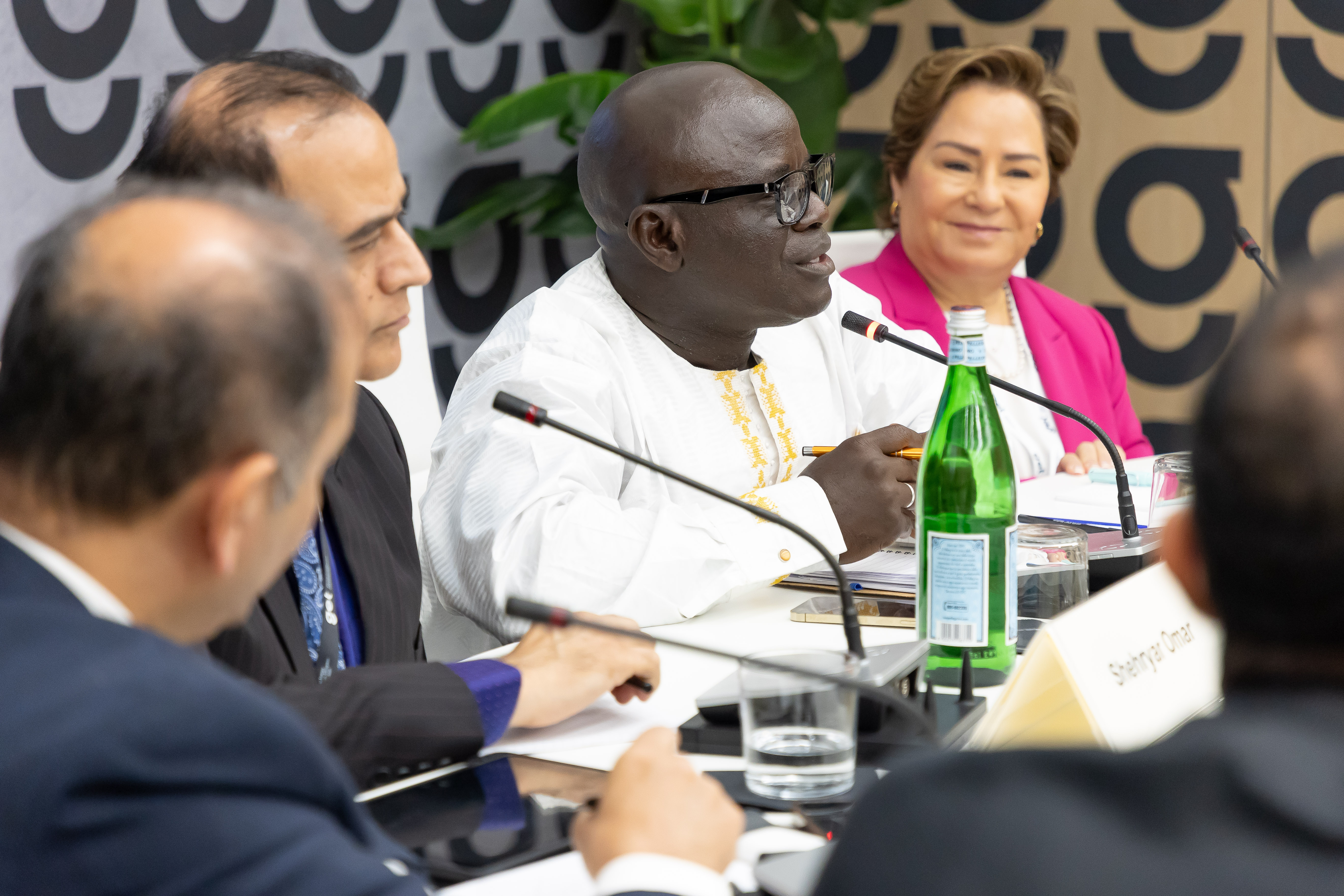By 2050, 86% of the world’s people will live in the Global South and East. This rapidly expanding population will drive extraordinary energy demand growth in some of the world’s most energy stressed regions. At GET Congress 2024, senior stakeholders from the worlds of policy, international development, finance and industry discussed the crucial capital needs underpinning the clean and affordable supply challenge.
Financing any aspect of the energy transition is tough. Funding the developing world’s transition is altogether one of the more complex challenges in tackling climate change. It was a central topic at the Global Energy Transition Congress in Milan. Ed Crooks, Vice Chair Americas, and I joined a full and frank discussion with guests including Rt. Hon. Tony Blair, Secretary John Kerry, Ministers of State from multiple developing countries, Ambassador Patricia Espinosa, and industry leaders from energy and finance. We picked out five main themes.
"Many emerging economies have the natural resources to build a low carbon energy system; but they desperately need access to substantial external sources of low-cost capital in order to develop them." - Leadership Roundtable participant
First, there is widespread recognition that the transition in the developing world depends on foreign investment. But it should also be seen as an opportunity for investors which it isn’t just yet. Many emerging economies have the natural resources (solar, wind, hydro, geothermal) to build a low carbon energy system; but they desperately need access to substantial external sources of low-cost capital in order to develop them.
A strong message was that there is too much expectation that developing countries should transition and reduce emissions even as they strive towards prosperity. The responsibility should really lie with wealthier, developed countries owning 90% of global GDP and responsible for 90% of emissions. If they were to get on track for Net Zero it would both solve the climate problem and deliver the viable and affordable low carbon technologies the developing world can utilise.
Second, money has begun to flow, but at a miserly rate. The developed world has finally come good on its commitment at COP15 in 2009 to mobilise US$100 billion a year for developing economies to tackle climate change. That target was achieved in 2022 and probably repeated in 2023, the thirteen-year lapse in time indicative of how difficult it is to translate climate aspirations into actions. Even with the target reached, there are developing countries frustrated they are seeing none of it yet.
In the meantime the financing ask is ballooning. Current estimates suggest that upwards of US$4 trillion a year is needed to tackle adaptation and mitigation in the developing world, at a time of record levels of indebtedness for much of the developed world.
Interview with Ambassador Patricia Espinosa at the Global Energy Transition Congress 2024 in Milan.
Third, the environment for the investment in the energy transition is challenging everywhere. Renewables build out is happening. But the anticipated scaling up of low carbon technologies such as hydrogen and CCUS is not taking off at the pace expected even where the policy framework and subsidies are supportive such as Europe, UK and USA. It’s exponentially tougher for developing economies. Perceived lack of political stability and limited policy frameworks to support low carbon investment add to the risks for investors. We estimate the cost of capital in non-OECD countries averages 12% to 14%, three times that in OECD countries.
Fourth, developing economies need a ‘roadmap’ for accessing low-cost finance. Companies, NGOs and governments in the developed world can help. The private sector won’t invest in low carbon projects that require capital to be committed for decades absent the fundamental basics that help underpin economic returns. Foremost among these are political stability, transparent governance, legal and commercial frameworks, policy signals and energy market rules. Offtake arrangements, say for a renewable hydrogen project with an investment grade user such as a utility or industrial consumer, can be critical to whether a project can secure financing.
“Global institutions maintain special drawing rights that can be allocated to climate mitigation and adaptation projects. The IMF could use the same approach as during the peak of the Covid pandemic, when it released US$650 billion to developing countries." - Leadership Roundtable participant
Fifth, where will the finance come from? Carbon markets are widely seen as a potential solution, in its simplest form taxing emitters and incentivising investment in low carbon systems. But a global carbon market awaits major emitters such as the US, China and India implementing schemes in their home markets at prices high enough to drive low carbon investment. That seems a long way off. Credit is due to philanthropists, but the sums Bill Gates, Jeff Bezos and others are mobilising are minuscule in the grand scheme of things. Global institutions including the World Bank and the IMF maintain the special drawing rights (SDRs) that can be allocated to climate mitigation and adaptation projects. The IMF could use the same approach as during the peak of the Covid pandemic, when it released US$650 billion to developing countries.
The big money, though, lies in private hands, the ‘wall of capital’ held by companies and institutions looking to invest in attractive low carbon opportunities across the developing world. Crowding in that private capital depends on clear policy signals that have yet to materialise from developed world governments including the US, EU, UK, Japan and others.
A proposal at GET for a ‘Global Climate Bank’ resonated. Perhaps the time is right for a global body to play the missing coordinating role between governments, private companies and institutions critical if finance at the scale required is to be channeled to the developing world’s energy transition.
Register your interest in GET Congress & Exhibition 2025 here: https://www.getcongress.com/forms/register-your-interest-2025/

Roundtable Participants:
- Rt Hon Tony Blair, former Prime Minster of GB and NI
- Secretary John Kerry, 68th US Secretary of State, USA
- H.E. Dr Doris Anite-Uzoka, Federal Minister of Industry, Trade and Investment, Nigeria
- H.E. Musadik Malik, Minister of Energy, Pakistan
- H.E. Davis Chirchir, Cabinet Secretary, Ministry of Energy and Petroleum, Kenya
- H.E. Parviz Shahbazov, Minister of Energy, Azerbaijan
- H.E. Antonio Manda, Permanent Secretary, Ministry of Ministeral Resources and Energy, Mozambique
- Hon. Christopher Keikura Vandy, Chairman of the Parliamentary Energy Commission, Sierra Leone
- Chief Ajuri Ngelale, Special Presidential Envoy on Climate, Nigeria
- Ambassador Patricia Espinosa, formerly Executive Secretary, UN Climate Change
- Assoc. Prof. Sudharma Yoonaidharma, Commissioner, Energy Regulatory Commission (ERC) of Thailand
- Lord John Browne, Chairman, BeyondNetZero
- Marco Alverà, CEO, TES
- Dr Philip Mshelbila, CEO and MD, Nigeria LNG Limited
- Maurits von Tol, Chief Executive – Catalyst Technologies, Johnson Matthey
- Benedikt Sobotka, CEO, Eurasian Research Group
- Heather Buchanan, Chief Executive & Co-Founder, Bankers for Net Zero
- Jesus Cotobal, Senior Vice President – Financial Sponsors, Corporate & Investment Banking, BBVA
- Derek Wong, Vice President, Government Relations and Public Affairs, Excelerate Energy
- Shehryar Omar, CEO, Petroleum Institute of Pakistan
- Gonzalo Cabrera, Founder and Partner, C Energy Consulting
- Hassana Mbeirick, CEO, Meen&Meen
- Bertha Dlamini, Founding President, African Women in Energy and Power
- Nooshin Behroyan, CEO and Founder, Paxon Energy & Infrastructure
- Ben Shorten, Partner, Gibson Dunn
- Moderator: Simon Flowers, Chairman and Chief Analyst, Wood Mackenzie



